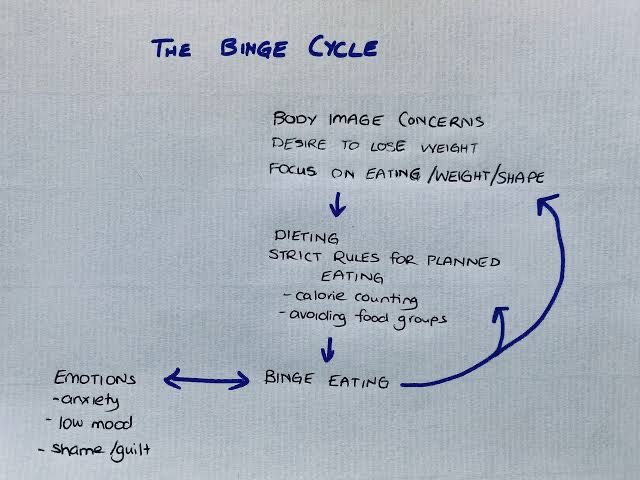What is binge eating?
If you are struggling with binging you are not alone. Binge eating is extremely common affecting about half of the eating disorder population. If you consider that an estimated 9% of Australians experience an eating disorder at some point in there lives that means there are about a million Australians that could be affected by binge eating at any given time.
Binge eating can be objective where you are consuming a vast amount food in a short period of time. Or it can be subjective where you feel you have consumed a large amount of food even though objectively you haven’t.
Eitherway both types are compulsive behaviours characterised with feeling out of control and unable to stop. It is really distressing and can affect not only people suffering from Binge Eating Disorder, but it is also a feature of Bulimia and is common in those suffering from Anorexia. In addition, a lot of people will suffer from intermittent binges or feelings of being out of control with their eating without necessarily fitting the full criteria for an eating disorder.
All suffers report feelings of intense shame and guilt which unfortunately leads to self-loathing, poor body image, preoccupation with body size, shape or weight, low self-esteem, anxiety, depression and irritability. Not to mention the physical risks and impacts of ongoing binging.
Binge eating often unfortunately leads to attempts to diet or restrict food intake which fuels more preoccupation with food, weight and size which inevitably leads to more binge eating. It becomes a vicious destructive cycle and the longer it goes on the more powerless you may feel to break free.
Recognising that is a problem is the first step to overcoming binge eating. It is not simply eating too much at a special dinner or occasionally having that extra slice of pizza and feeling uncomfortably full. Everyone overindulges sometimes and I would arguably say that is part of healthy eating like going to town on a hotel buffet or the food coma after Christmas lunch! Binge eating is different in that it is usually ritualised, habitual, reoccurring and always paired with secrecy, guilt, shame and feeling out of control.
So how do you stop the binge eating cycle?
Everyone’s battle with binging is unique and there is no simple fix. However, the following tips can be highly effective in helping you to regulate your eating patterns.
Practice Mindful Eating
Binge eating is mindless eating so one of the best ways to start to break the binge cycle is to practice mindful eating. This involves really slowing down your eating, being purposeful with your food choices and mealtimes and structured in how you approach your eating. It is also very helpful to start tuning in with your hunger and fullness cues. I recommend eating all meals at the table and being present without distractions for example avoid eating in front of the TV. Observe what is happening in your body when you are starting to feel full and try to stop eating when you are moderately full. Moreover, start to eat when you are moderately hungry. Tuning into these cues helps you break out of the binge extremes of only responding to the extreme cues of extreme hunger and extreme uncomfortable fullness. Remember tuning into these cues takes time but by slowing down and being mindful you are creating the space to start listening to your body.
Eat Adequately and Regularly
Restriction and inadequate food intake are usually part of the binge cycle. So regardless of where you are at with binging it is important to eat adequately and regularly as restricting and letting yourself get physically hungry is a huge binge trigger. You can’t even begin to work on the emotional eating component if you are not eating to your body’s physical nutritional requirements. Eating a balanced diet that incorporates all the food groups is essential as often binging is your body’s way of trying to compensate for what is lacking in your diet.
Journal
Binging is an unconscious behaviour and cuts you off from awareness about your mental and physical state. Journaling is crucial to developing self-awareness and can help you identify patterns. Journaling can also assist you to see what your triggers are. You may not notice anything straight away but after a while if you stay consistent with keeping a daily journal you might realise “oh I always binge on a Tuesday after that meeting with my boss!” So you can see what the patterns or triggers might be. They are there you just need to develop the awareness to spot them. Journaling can also help you keep track of if you are eating regularly and adequately. As with any change it takes time and patience but can be extremely effective in breaking the cycle.
Know your Triggers
Binge eating often prevents you from identifying your feelings and needs. Often my clients will report that there are no triggers outside “habit” “boredom” or “being weak-willed.” This is rarely the case! If you see binge eating as part of the cycle what else is happening in the cycle that is triggering the binges? Common triggers are a preoccupation with weight and size, restricting food intake or being rigid with food rules, labelling foods as good or bad, poor stress management, relationship issues or underlying depression and anxiety. Addressing your triggers and finding healthier coping mechanisms is an essential part of stopping your binges.
If you are struggling to overcome binge eating therapy can help. Contact me today to see how I can support you to break the binge cycle.



